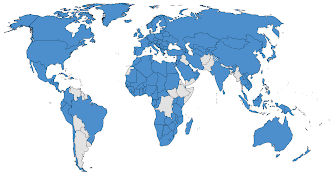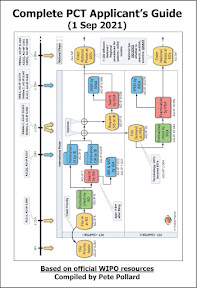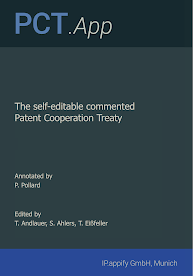 During the annual EQE Tutor's meeting on 19 & 20 Oct 2021 (online this year), EQE 2021 was discussed in detail, as well as the expectations of changes to be implemented for EQE 2022. The general approach is to slowly improve the issues: each change needs to be thoroughly tested to make sure improvements work reliably and do not make things worse. I have now tried the updated WISEflow platform and summarised the most important points and tips relevant for EQE 2022 based on the meetings and the experiences from candidates last year.
During the annual EQE Tutor's meeting on 19 & 20 Oct 2021 (online this year), EQE 2021 was discussed in detail, as well as the expectations of changes to be implemented for EQE 2022. The general approach is to slowly improve the issues: each change needs to be thoroughly tested to make sure improvements work reliably and do not make things worse. I have now tried the updated WISEflow platform and summarised the most important points and tips relevant for EQE 2022 based on the meetings and the experiences from candidates last year.
1. General advice:
- Watch the EPO’s EQE pages for updates: EPO EQE online page, EQE Notices & Downloads, EQE FAQ's
- Join the EQE Telegram groups to discuss issues with other candidates: Main group (283 members), Study group (108 members), ABC&PE-claims (167 members), D&PE-legal (137 members) and Marketplace (58 members). The groups are public, and open to any tutors or candidates. A few rules: treat others with respect, no discussion of cheating, no exchange of large sections of copyrighted materials (use of excerpts for study and discussion allowed). During scheduled exams, no discussion of the exam questions or answers. During mocks, no restrictions.
- WISEflow and LockDown browser provide limited possibilities compared to daily online working, so practice as much as possible with them.
- Do as many mocks as possible, even if you have not had any problems before. If short on time, at least do the initial part where the photos are taken and the flow is started.
- Practice using the External references, and decide beforehand what will be faster to look up on paper, and what will be faster online.
- Maximise your typing speed by taking an online typing course and using a comfortable keyboard / mouse. Become less dependent on answering on paper.
- Although helpdesk will be available and there are possibilities for complaints and even appeal, any issues during an exam will cause at least 20 minutes to be lost, and there is a minimum amount for marking that you must hand-in to be awarded a pass. So, it is better to avoid issues as much as possible.
- Lockdown browser is designed differently to other apps - it is not designed for stability, but to continuously monitor and to crash when something suspicious is detected. On startup, certain applications are closed. During operation, anticipated "forbidden" actions are blocked. But there will always be situations that are unexpected and unanticipated, particularly when running on the many different hardware/software configurations.
- Software is being continuously updated, so past positive results during mocks do not guarantee that you will have no issues during the exams.
- Least chance of issues if you use a dedicated desktop with one screen (at least 27 inch), one camera, one microphone, one keyboard, one mouse, one loudspeaker device, one printer, direct wired (USB/HDMI) connections to all peripherals, administrator access, cabled (LAN) access.
- Don't use: hardware and apps you do not need, VPN (changes to IP address crashes LockDown Browser), and docking stations/port replicators.
- Turn off: screensavers, sleep/hibernate functions, scheduled tasks like virus checking and backup, and delay windows updates.
- Most chance of issues: corporate laptop without administrator access, laptop with an internal and an external camera, intelligent firewalls, or active virus scanners.
3. Advice about EQE 2022 Exams
- Expect the 2022 exams to look very similar to the 2021 exams. Making exams takes 2-3 years in total, so the EQE 2022 exams cannot be fully adapted to the online format. It is not easy too split an existing exam into parts. EQE 2021 exams also had this problem - splitting was done by the relevant committee under responsibility of the Examination Board.
- The version of WISEflow and LockDown Browser available at Christmas 2021 will be the final one.
- More than one answer is frequently accepted (decided after the exam). But you can still fail if you are an acceptable answer track, and don't hand in enough to be marked. Make sure you hand-in as much as possible.
- B exam will be still be difficult because you cannot easily compare - no side-by-side viewing of tabs.
- C exam will be difficult because of the split into two parts.
4. WISEflow and LockDown improvements for EQE 2022
- Current version: LockDown Browser 2.07.07 - 18 Dec 21
- Can now annotate exams when opened in a tab. Comments can be added, text can be highlighted, shapes can be added. These annotations are visible in all tabs where the exam is opened.
- Opening too many tabs used to longer crash the LockDown Browser. The maximum number of tabs depends on the display size. Now, a warning is generated that tabs must first be closed before new tabs can be opened.
- Can now apply strikethrough to text in the answer to be handed in.
- Copy paste seems to me to be improved. However, this is a problem where they do not understand what the cause of the problem is, so it is not certain it will work well on all exams.
- The invigilation has been integrated into a green hover button/window which remains on top in the answer tab.
- Language switching of assignment has been changed to avoid the D1.1 problem in 2021.
- Side-by-side viewing of tabs is still not possible. Only the exam preview window can be viewed next to the answer tab, which is very limited in functionality.
- Pre-exam: the three languages have been separated in the questions, but not in the answers.
- ALT-TAB caused problems last year with crashes after being entered twice. It was stated during the 2022 exams that that it will just have no function. I have not seen any any problems during the mocks. I will try again in the full-function mocks in January.













